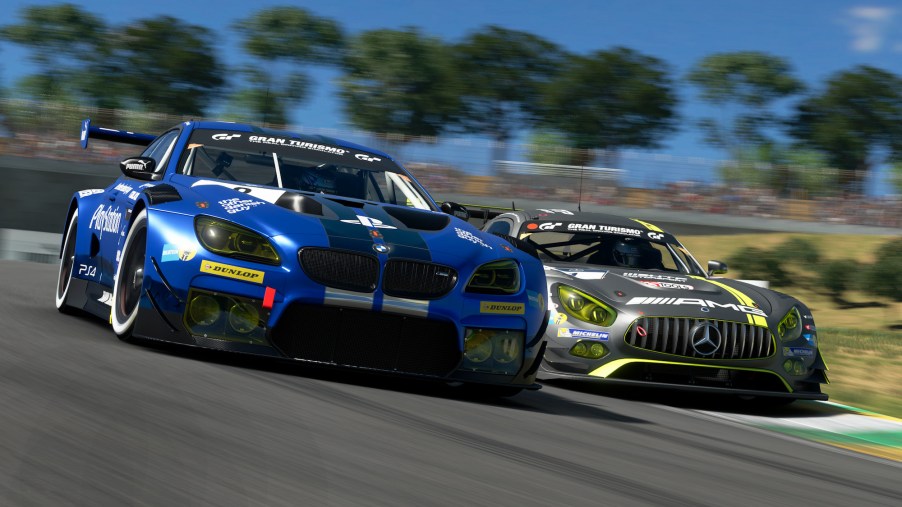
BMW Sinks Millions Into Esports to Market to Future Car Buyers
Lots of people play video games at home. But most of us aren’t talented enough to take our hobby to an elite level. Those who possess the skills can compete on esports teams, with access to tournaments, fans, and sponsorships. With quickly growing fan bases, corporations are taking notice. BMW definitely has. And the company has sunk millions of dollars into esports to reach future car buyers.
What is esports?
Esports involves competitive video gaming and international tournaments. , According to CNN, it’s a rapidly growing sport with millions of fans and plenty of money on the line. The esports industry is expected to be worth more than $2 billion by 2023, Forbes reports. Competitive gamers can earn seven figures in winnings plus brand endorsements, sponsorships, and league salaries. And tournament prizes can reach into the millions of dollars, split among players on the winning teams.
Players compete in the same video games that casual gamers play at home. But competitive gamers play in leagues or on teams in contests aired on TV or streamed on platforms such as Twitch. Watching esports is especially popular in North America, China, and South Korea. Tournaments can draw as many viewers as other sporting events.
BMW has increased its involvement in esports
Esports brings in lots of money for players, brands, video game producers, and tournament organizers. The large audience makes esports appealing for auto manufacturers too. In the spring of 2020, the BMW Group announced it would increase its sponsorship involvement in esports for marketing purposes. According to Forbes, BMW formed “platform and partnership deals” with five organizations: Cloud9 in the United States, Fnatic in the United Kingdom, FunPlus Phoenix in China, G2 Esports in Germany, and T1 in South Korea. These five teams have about 200 esports players across a variety of games.
A BMW press release explains that the deals “will include content development across social media [and] information sharing and technology transfer with its engineers and designers on hardware and software.” BMW will give each of its teams an official vehicle and produce social media content about the teams using #UnitedInRivalry and #UnitedAtHome on multiple platforms, including Facebook, Twitter, Instagram, and Twitch.
The automaker is spending millions on increasing its esports presence. That’s part of its approximately $100 million budget for all advertising. BMW’s esports involvement caters to children and teens — future car buyers. “Esports is a way for us to reach Generation Z, who aren’t interested in us now, but there will come a time when they’re ready to buy a car, and we should be in their mind when they do,” Stefan Ponikva, head of BMW brand experience shows and events, told Digiday.
BMW has recognized that kids aren’t watching much TV these days, so it’s marketing to future consumers where they are now. Ponikva told Digiday: “We don’t see esports as sponsorship activation. It’s more a strategic communications channel.”
The automaker also added virtual car racing, called sim racing, to BMW Motorsport in 2020. BMW cars such as the M8 GTE, M4 GT4, and M2 CS Racing are featured on platforms like iRacing and rFactor 2. The M4 GT3 was added in 2021, along with the Assetto Corsa Competizione platform, BMW Motorsport reports. In addition to the cars, BMW also now has BMW Motorsport SIM Racing partner teams and is developing a training academy.
The pandemic’s influence on esports
Though many in-person events haven’t happened during the pandemic, fans have continued to watch online. Traditional sports have had a tough time during the pandemic, and the 2020 NBA Finals had less than a third of the viewers it saw in 2019. But esports was able to continue its growth through the pandemic. Watching esports can be interactive and offers a chance at connections, which have been lacking throughout the pandemic.
In addition to manufacturers, auto racing organizations such as NASCAR and Formula One are also increasing their esports involvement in part because there haven’t been as many live races during the pandemic. However, these teams have used professional racecar drivers as the esports competitors.
Though esports has grown in size and importance since the pandemic, BMW was ahead of the curve in investing early. “We signed the contracts with the teams [in 2019], so there’s no direct correlation between these deals and the pandemic,” Ponikva told Digiday.
And, as Digiday reported: “Stuck-at-home consumers are increasingly embracing the idea of watching other people play video games in the absence of live sport[s].” BMW had already positioned itself to take advantage of the growing interest in esports. Its cars, drivers, sponsored teams, and social media marketing are spreading awareness of the brand.


